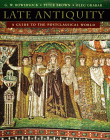![[ Theodora Graphic ]](bargraphictheo.jpg)
![]() Justinian and Theodora
Justinian and Theodora![]()
General histories![]()
Sources
Procopius
Other authors
Art / Images
Studies
Articles and other academic
Special Topics
Other
Miscellaneous
Late Antique / Byzantine links
On-Site Content
About this site
Discussion Board
| Late Antique / Byzantine links |
K.H. Kinzl's useful "The Main Literary Sources For Late Antiquity," short descriptions of some sixty sources. See also his Select bibliography of monographs on Late Antiquity.
Society for Late Antiquity, an enormous list of resources, including information on the LT-ANTIQ discussion list and an enormous list of sources on the web.
 Amazon. Late Antiquity : A Guide to the Postclassical World, ed. G.W. Bowersock, Oleg Grabar and Peter Robert Lamont Brown. A
fantastic book! See
The Harvard UP review clippings.
Amazon. Late Antiquity : A Guide to the Postclassical World, ed. G.W. Bowersock, Oleg Grabar and Peter Robert Lamont Brown. A
fantastic book! See
The Harvard UP review clippings.
Reviewed by Ralph Mathisen, BMCR 2000."In general, the volume's great strength lies in its non-political, topical entries relating to late antique practices and institutions. These are just the things that are lacking in standard dictionaries of people and places. In this regard, this "Guide to the Postclassical World" fills an essential niche not occupied by any other existing compendia. The attention it gives to the eastern world, and to integrating (as much as possible) the Roman and Sassanian/Islamic worlds into a single whole, also is to be welcomed. It makes a strong case for focusing upon the similarities, rather than the differences, between the eastern and western worlds."
Robert M. Grant for The Christian Century.
Rochelle Caviness for Suite 10. "It is difficult to find anything bad to say about this book."
Stephen Gapps for mail-group "living-history" (brief boosterism)
BYZANS-L, a discussion group for Byzantine Studies, Subscription Information.
Byzantium: Byzantine Studies on the Net, edited by Paul Halsall. Includes numerous link-lists and other useful matter.
Gouden Hoorn (Golden Horn), Journal of Byzantium. Edited by Annabelle Parker and André de Raaij. Newly relocated to this site!
Discussion of whether John Julius Norwich's books are good from Byzans-L. Search down, it's in two pieces. Somewhat heated.
Paul Halsall: "John Julius Norwich is a more-than-competant writer of narrative history. His works are not, however, in any sense anything more than archaic popularisations... As a member of the British elite he seems to take the history of the elite to be history itself. This was all very well 50 years ago and even then Ostrogorsky, whose work remains the best introduction, at least addressed class and economic issues, but I, at least, hope we have transcended the period when history writing was an upper-class entertainment."
Harvey David: "Unfortunately there is no popular market for most works on Byzantine history (by popular I mean a market among those who are interested in the study of history, but, like myself, pursue this as a leisure interest), without authors such as Norwich we are unlikely ever to have one, or to draw more individuals to take a serious interest. My own interest in 'Byzantinology' developed from a book of a BBC radio series which was concerned exclusively with political and art history. I doubt if Angold's economic history of the 12th Century would have gripped in quite the same way - I was 16."
 Amazon. A Short History of Byzantium by John Julius Norwich.
Amazon. A Short History of Byzantium by John Julius Norwich.
New York Times review by Michael Anderson (1997).
Anne Comnena, The Alexiad. Newly on the web from Paul Halsall and his Internet Medieval Sourcebook. (Fantastic!)
Amazon. Constantinople: City of the World's Desire, 1453-1924 by Philip Mansel. Currently out of stock.
Excerpt: Chapter one (courtesy the Wasington Post)Review by John Ash for the Washington Post.
"I am convinced that it will continue to perform its historic role as 'a door in the wall between Islam and Christianity' and, more generally, between East and West. It is a place we need now more than ever."
All material © 2000–2004 Tim Spalding.
Presented in Association with Amazon
If you enjoy this site you may also like these other sites by me:
Alexander the Great on the Web. Over 1,000 annotated links and 200 images of the Macedonian conqueror.
The Istanbul Mosaic Museum on the Web. Guide and gallery to these Justinianic masterpieces.
Herodotus on the Web. Linked guide to the life and writings of the Herodotus of Halicarnassus, the father of history
Gouden Hoorn / Golden Horn. Journal about Byzantium. (Hosted here, but edited independently)



